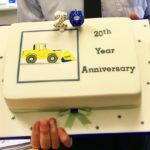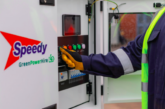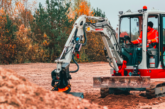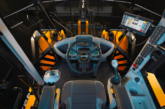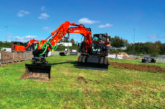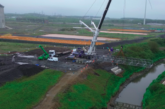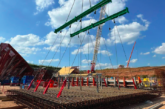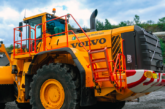2019 marks the impressive 20-year anniversary of the UK’s leading attachment manufacturer for mobile plant machinery, Ulrich Attachments.
Having grown from strength-to-strength over the past two decades, the firm has proved itself to be a true British engineering and manufacturing success story; designing and producing ranges of buckets, forks, couplers and winches in the UK on a bespoke basis, with each assured to increase the versatility of brand-leading plant and farming vehicles.
By working in partnership with its impressive client base to purpose design attachments, Ulrich has delivered results that mutually benefit both manufacturer and client; using first-hand knowledge to further machines’ capabilities with the addition of quick-coupling, bespoke attachments, and in doing so, develop customer relationships.
It’s a fine example of a British firm that’s applied dedication and design prowess to progress its size, product portfolio and reputation, running at a pace that shows no sign of ceasing. Owner and managing director Jim Hopkinson, has had his hand on the company helm since he bought it, as part of a management buyout in 1998, with a mind to expand a niche operation into something much greater.
At the time, the attachment manufacturing division – soon to become Ulrich – was part of the Boughton Group, which was one of Britain’s longest established designer and manufacturer of hook loaders, skip loaders and close coupled trailers. A successful firm carrying an impressive 100-year heritage, The Boughton Group encountered cash flow problems during a credit squeeze in 1997, and in the buyout that followed, Jim, who had only recently joined the company as the Design and Manufacturing Director chose to purchase the company’s winch, bucket and attachment operation.
His highly relevant background placed him as an expert in the attachment field. Having grown up in a farming environment, before training as a mechanical design engineer with the Boughton Group, Jim went on to tour the world testing machinery for agricultural machinery manufacturer, New Holland. When New Holland closed its UK plant in 1998, Jim opened a design consultancy business and over the years the Boughton Group became his biggest client. He then joined the company as Engineering and Production Director in 1995. Seeing the business potential in Boughton’s bucket and winch manufacturing operation, Jim took the division’s existing contracts, together with members of both its engineering and sales work force, and began a journey that would see him build on the operation’s potential, to soon position Ulrich as a specialist in the exemplary design and manufacture of front-end attachment buckets.
“We started out as a small, close-knit team, taking the name of our firm from the designer of that original bucket, Ulrich,” Jim explains. “When I bought the enterprise, the bucket side of the business was minor, but we had plans to change that considerably.”
With his proven background in design, dedicated approach to creating and reviewing designs, and success in developing relationships with OEMs, hard work and commitment soon began to pay off, and Jim and the team were able to operate both an assembly facility located in Aylesbury and a manufacturing plant in Hull.
Simultaneously, Ulrich’s product portfolio began to build, as Jim added to the range by refining designs to create alternative attachments, marking the beginning of the extensive catalogue of apparatus the company manufactures today.
Demand for Ulrich’s designs, and subsequent user recognition led to business expansion, and as early as 2000, military contracts began to be won – adding to orders placed for plant attachments.
In 2004 Ulrich began designing and supplying prototype attachments for BAE Systems and after a long development period received a £5 million contract to equip the Terrier Armoured Support vehicle – the most technologically advanced and flexible combat engineer vehicle in the world.
This impressive expansion led to a shift in business process. With both military and plant contracts to fulfil, there were more sectors to focus on, so to effectively manage change and development, Jim tailored his already fluid and highly committed approach to the firm’s organisational structure.
His personal focus remained primarily on manufacturing, with time allocated to developing future capabilities within the firm against the challenges presented by the skills shortage and aging work force. To fulfil supporting operational needs, he began to bolster the sales and management teams and put plans in place to take the company forward; preparing it for the future and its growing customer base.
“This has been a terrific business to develop, with ever-increasing demand for specialist products and the potential to expand design concepts that serve to enable,” he continues. “With portfolio expansion, comes the need for a team equipped to support both product and customer. We’re committed to evolving our workforce so it’s future-ready for business, but also versed in the principles that have made Ulrich such a success to date.”
The values Jim believes in revolve around team work and relationships; ideals that have helped Ulrich keep pace within the industry and work compatibly with the customer.
“In our industry, customer communication is essential. As most of our clients have operating bases in the UK, they need a local partner to meet, discuss and design the exact attachments that will fit their machines perfectly, and function in accordance with their own customers’ requirements.
“Our clients’ customers are looking for more than an individual machine, they’re seeking a machine with the working attachment capable of fulfilling the task that applies to them; whether that’s on the construction site, in the agricultural environment or on the military field.
“The nature of our work requires us to design and build in Britain, so we’re in the best position to monitor quality, manufacturing and our own supply chain. Each product we build is individual, nothing is mass produced. As such, our business doesn’t suit an import strategy. In fact, our design and manufacturing process works best when it’s kept close, which makes us as unique as the UK market we design for.”
Although Ulrich operates from the UK, it has also developed a global reputation over the past 20 years, by exporting through OEMs whose machines are distributed internationally, inclusive of a purpose designed attachment.
“Our design teams work alongside British heavy plant manufacturers on machines intended for international export. By supporting our clients through sharing information, we can make changes together and essentially achieve the correct design and manufacture at this end; developing solutions together, that lead to mutually beneficial results, including stronger relationships.”
Working with clients, Ulrich has developed solutions for brands including JCB, Volvo, Cat, Bell, CNH, Hitachi, Liebherr and the MOD believing that by designing together, the core of all businesses involved are strengthened.
It’s what’s defined the success of the Ulrich business model to-date, and is a concept planned for continued use in years to come, as the bespoke attachment specialist, born from modest beginnings, extends its reach towards the next two decades.

